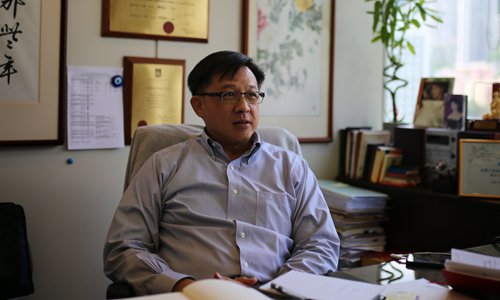HOME >> CHINA
British universities under fire for politicizing honorary degrees
By Li Ping and Fan Lingzhi Source:Global Times Published: 2019/11/6 23:35:03

Junius Ho Kwan-yiu, a lawyer and pro-establishment legislator in Hong Kong Photo: Fan Lingzhi/GT
British universities are under criticism for political bias, losing prestige over more than one case of stripping honorary degrees of foreign politicians, Chinese experts said, referring to how Chinese netizens were infuriated over a recent withdrawal of honor of Hong Kong pro-establishment legislator and lawmaker Junius Ho Kwan-yiu by a UK university.
Anglia Ruskin University (ARU) in Cambridge withdrew Ho's honorary law degree in October, claiming he "has caused increasing concern," after a member of the British parliament urged the ARU to withdraw his degree based on an allegation of Ho shaking hands with individuals allegedly related to an attack on a passenger train at Yuen Long in July.
"This is not the first time that Western universities, which assert academic independence from politics and flaunt academic freedom, have used degree-stripping as a tool to crush eastern politicians with different ideologies and political positions," Zhang Yiwu, a professor at Peking University, told the Global Times.
"This has been a long tradition in Western universities if you remember how Aung San Suu Kyi's award was suspended by a UK union and Bristol University in 2017 over Myanmar's crisis," he continued.
In 2017, one of Britain's largest trade unions suspended an award given to Aung San Suu Kyi during her time as a political prisoner, the Guardian reported, as a result of her controversial response to Myanmar's humanitarian crisis.
The move came as a number of British institutions that awarded honorary degrees to Aung San Suu Kyi, including Bristol University, said they are reviewing or removing honors bestowed on Aung San Suu Kyi during her time in opposition.
"These Western universities take the partial facts they see in the Western media as the whole truth. Armed with these reports, they make decisions they take for granted," Zhang explained.
But their decision itself has a certain presupposition, which reflects the difference of ideology and values between the east and the west. The judgment of this value is very subjective, and the "fact" on which it is based is also controversial, which explains why their decision cannot be accepted by the mainstream society in China, Zhang told the Global Times.
"This is a blatant political crackdown, an assault on academic freedom and democracy," a Chinese netizen commented on Weibo.
"This puts a question mark once again on the credibility of UK universities because they are clearly mixing academics with politics," another comment said.
"The case demonstrates that so-called justice in the UK judicial procedure is flawed, and anything will be put aside in the face of politics," Ho said in an earlier response to the Global Times, noting that he was left with no chance to respond.
British universities have presented an arrogant, incontrovertible attitude in making such a decision, Chinese experts said.
Ho said in a public statement via social media on October 29 that he was saddened that academic repression, political repression and procedural injustice had taken place in Britain, the birthplace of common law and judicial review.
Ho doubted what right a British legislator had in judging China's domestic affairs. The West uses all means to suppress the power that resists color revolution, Ho noted in the statement.
"We support Ho in protecting his legal rights. He should give back the honorary degree to the British university, as schools that do not respect people do not deserve the names of our honest and patriotic Chinese people," said a widely liked comment on social media.
"This is the 'political correctness' in the academic environment of Western universities. It is also obvious that Western universities are catering to the Western mainstream society," Zhang said.
"The West's academic environment links with the political establishment, which has been evident for quite a long time … They do not wish that you take their degree and challenge their values at the same time. The university decisions are part of a wider political divide between Eastern and Western values," Zhang stressed.
In a separate case, London School of Economics (LSE) in the UK issued a formal statement last month confirming separatist Taiwan regional leader Tsai Ying-wen's PhD after receiving a large number of queries regarding the authenticity of Tsai's dissertation and doctoral diploma. But the statement did not convince all, as an officer from the LSE library had once confirmed earlier that Tsai's thesis was unavailable and the LSE library has never had a copy of it, Taiwan media reported.
However the university did not give a clear explanation for the inconsistent responses.
"We cannot rule out the possibility that the LSE will back Tsai Ing-wen up for political reasons," an LSE aluminum told the Global Times.
LSE sent a high-profile congratulation on its official Facebook page to Tsai Ing-wen, an LSE graduate, in January 2016 when Tsai became Taiwan's first female leader. "We're thrilled to read that she attributes her international perspective to studying in London with us," the post said.
Posted in: IN-DEPTH,HK/MACAO/TAIWAN